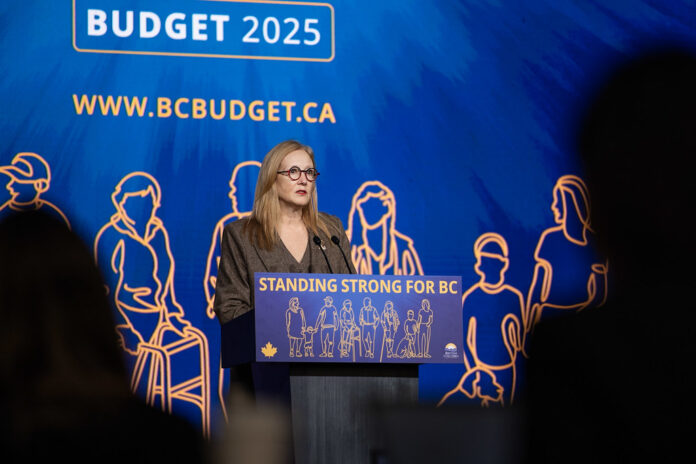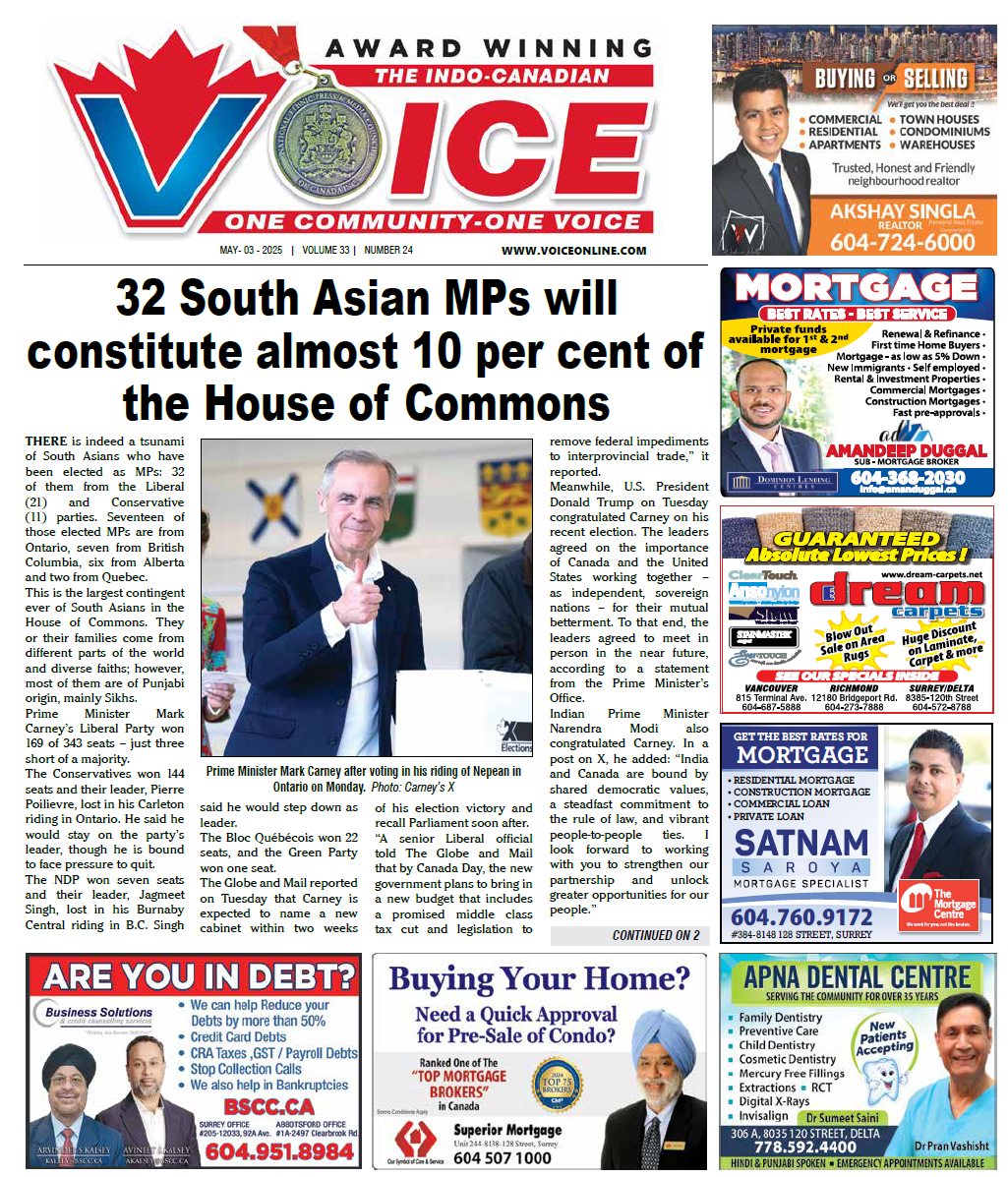B.C. Conservative Party

THE B.C. Conservative Party said that David Eby’s NDP government delivered a stand pat, do-nothing budget, despite the longstanding threat of destructive American tariffs coming true on budget day.
Eby’s budget uses a pre-election economic forecast, but:
* $1,000 grocery rebate is cancelled
* Carbon tax is going up
* No tariff relief plan
* No plan on inter-provincial trade
* Record deficit of $10.9 billion
“The Premier and the Minister of Finance could have easily taken the time to deliver a budget with substantial tariff relief,” said Peter Milobar, Official Opposition Finance Critic. “Instead they pushed ahead with a hastily-arranged plan that provides nothing for the people of this province.”
He added: “David Eby promised $2 billion in tax relief during the election – a $1,000 grocery rebate for every household. Now families will need to come up with that $1,000 themselves.”
Despite removing $2 billion from family grocery budgets this coming year, the NDP budget still clocks in with a record deficit of $10.9 billion, he noted.
“The Premier and his finance minister are using the same growth number for the economy that was published before last year’s election,” said Milobar, “but he’s ditched his grocery rebate, and he’s still blown past his spending, debt, and deficit forecasts, setting new records for each one.”
Milobar pointed out that Eby’s NDP are still going ahead with a carbon tax hike of 3.3 cents a litre on April 1, making it more expensive to fill the tank as living gets more expensive.
“Ironically, the NDP is also putting sales tax on the price of used electric vehicles. There is simply no way to escape,” said Milobar.
Milobar noted that there is no plan and no economic modeling showing the benefit of removing barriers to trade between Canada’s provinces, potentially the most potent weapon available to Canadians in the face of American tariffs.
“Again, Premier Eby and his finance minister haven’t bothered to come up with a plan to get rid of trade barriers with other provinces,” said Milobar. “They didn’t do the homework they needed to do.”
B.C. Green Party

Photo: BC Green Party
AT a time of unparalleled economic uncertainty, rising costs, and ongoing climate crisis, this budget treads water – offering a $4 billion contingency fund but failing to deliver the creative solutions needed for transformative change, the B.C. Green Party said.
“What this budget does is buy us time,” said Rob Botterell, MLA for Saanich North and the Islands and Finance Critic. “Social supports are maintained, housing is prioritized, and there’s some effort to get more money to the front lines in healthcare. But what happens in a year when these short-term fixes run out and the debt has grown another $10.9 billion? There isn’t an action plan here for a 21st-century, innovation-driven economy that builds resilience in our society, protects our environment, and tackles climate change.
“In this moment of deep uncertainty, we need government investment in systemic solutions, not another ICBC rebate cheque. Meanwhile, only $238 million is allocated to fire management when wildfires cost us over $1 billion in 2023/24. It’s also troubling to see a $100 million cut to the Ministry of Food and Agriculture when food insecurity and scarcity escalate.”
Despite the urgency of the climate crisis, Budget 2025 offers no new details or significant funding for previous environmental commitments, like implementing the Old Growth Strategic Review, introducing the Biodiversity and Ecosystem Health Framework, or honouring the pledge to protect 30% of our lands and waters by 2030 (30×30). Leaving British Columbians wondering if this government understands what’s at stake for a liveable future.
“Though we are pleased to see funding for some Co-operation and Responsible Governance Accord (CARGA) initiatives – community health centers, psychologists under MSP, supports for renters and for people experiencing homelessness, and heat pumps,” said Botterell. “We’ve yet to see evidence that this government fully understands the size of the challenge that we face – financially, socially, and environmentally. $10 million for innovation in a $90 billion budget is nowhere near enough; we need a real shift, not more patchwork solutions that leave people and the environment behind.
“We need a paradigm shift to address the scale of the challenges we face. To support this, we expect to see concrete action developed under CARGA this year in areas such as forest management, CleanBC, social supports, and primary care.”
BC Chamber of Commerce

Official photo
FIONA Famulak, President and CEO of the BC Chamber of Commerce, said: “Budget 2025 was unveiled in unprecedented challenging times. The context in which our province and nation are operating has fundamentally changed overnight.

Photo: BCBC
THE Business Council of British Columbia (BCBC) said it is concerned about the ongoing deterioration in B.C.’s public finances, the absence of a credible path to restore fiscal sustainability, and a missed opportunity to improve conditions for private-sector investment and hiring.
“B.C. is in a deep fiscal hole – and one that is likely to get deeper,” said David Williams, BCBC’s Vice President of Policy. “Record deficits were already a concern, but once the full impact of U.S. tariffs is accounted for, the province’s financial outlook worsens significantly.”
BCBC recently released a ten-point blueprint outlining key policy priorities to strengthen the economy and address challenges posed by tariffs. These include restoring fiscal sustainability and tax competitiveness, growing the economy while reducing global emissions, and encouraging an open-for-business mentality.
“While we appreciate the Premier’s commitment to fast-tracking approvals for specific projects, this budget missed an opportunity to improve conditions for private-sector investment and hiring in the face of the Trump administration’s threat to B.C.’s industrial base,” said Jairo Yunis, BCBC’s Director of Policy.
“Now that U.S. tariffs are going ahead, we will be looking to the government to quickly follow up with bold action to improve our competitiveness and strengthen our economy.”
Debt rating: As recently as 2021, B.C. had a AAA credit rating from S&P Global. S&P Global downgraded B.C.’s credit rating from AA to AA- after last year’s budget—the third such downgrade in three years—with a negative rating outlook. Moody’s similarly shifted B.C.’s rating outlook to negative.
This year’s budget sees record operating deficits, high capital spending, and steeply rising indebtedness—even before fully incorporating the impact of U.S. tariffs. These developments could see B.C.’s credit rating further downgraded in the months ahead.
Hospital Employees’ Union (HEU)

Photo: HEU
THE Hospital Employees’ Union (HEU) said on Tuesday it is encouraged to see the province’s budget for 2025-2026 expand government support of public health care, including stepped-up capital funding of $15.5 billion for critical health care infrastructure.
“Today, we heard from the Premier that we’re in tough economic times globally with the tariffs being imposed by U.S. President Donald Trump,” said HEU secretary-business manager Lynn Bueckert. “At the same time, British Columbians have told us repeatedly they need to see improvements in the health care system.”
“Government tabled a budget today that will both increase investments in public health care, as well as provide a measured plan for B.C. as we move forward together through this moment of economic uncertainty,” said Bueckert.
Overall, the government is boosting health care investments over the next three years to ramp up capacity in the health care system, as well as build new and upgraded care facilities throughout B.C.
“In this budget, we’re seeing the government continue to renovate and build hospitals and long- term care facilities, including the new St. Paul’s and Surrey Hospitals,” said Bueckert. “While Conservative provincial governments across Canada are privatizing health care, this government chose to protect people and public health care, while safeguarding the economy.”
“HEU looks forward to working with government on the difficulties in recruiting and retaining health care workers” said Bueckert. “We know that it remains challenging to attract new health care workers because of workload issues and short staffing.”
The HEU represents 60,000 health care workers in British Columbia.
BCFED

Photo: BCFED
WITH Donald Trump implementing across-the-board tariffs on Canadian exports, it’s more important than ever to protect working people and their jobs, the BCFED said.
“Working people are already facing tough times, and these tariffs threaten to make them a lot harder. So it’s good to see the BC budget reject austerity, and continue to build on our strengths,” said BCFED President Sussanne Skidmore.
“The way to build economic strength in response to this threat is to invest in working people and good jobs. That’s the backbone of BC’s economy.”
BCFED Secretary-Treasurer Hermender Singh Kailley highlighted the budget’s provisions for fast-tracking major resource projects and building transit, transportation, health and education infrastructure. “These are welcome steps. And they should be backed by more funding for skills training, so we have the workforce to meet our economy’s needs,” he said. He added that BC’s public post-secondary institutions are in urgent need of support, as they face particular challenges due to federal international student caps.
“As the government moves to shape and implement its tariff response measures, we’ll be making it clear that the priority must be to protect workers and defend jobs. And any support for business must be explicitly tied to preserving employment,” Skidmore said.
She noted the government has refused to slash the services that support strong communities and BC families. “We know there’s real fiscal pressure on the government. But British Columbians made it clear in the last election they want government to do more, not less, to help them right now,” she said. “And in times of uncertainty, people rely on these services more than ever.”
As part of the province’s tariff response, Kailley urged the government to take another look at the budgets for the Employment Standards Branch and the Labour Relations Board.
“The employer-employee relationship is the most important relationship in our economy, and these two agencies are vital to keeping that relationship healthy for both union and non-union workplaces. Yet they’re both drastically underfunded, with outrageous wait times.
“By budget standards, a significant increase in funding for each board would cost very little. But it would have a major impact on strengthening workplace stability and certainty — and certainty is something our economy badly needs right now,” he said.
“Times like these require tough choices, and we’re glad the government isn’t choosing to add to the precarity so many workers face,” Skidmore said. “We’re going to keep pushing them to do more to strengthen the foundation of prosperity in our province: BC workers in good jobs.”
BCTF

Photo: BCTF
IN response to the provincial government’s new budget and U.S. President Donald Trump’s tariffs, BCTF President Clint Johnston said now, more than ever, is the time for the BC government to ensure British Columbia’s children and youth have the necessary support in schools to meet their individual needs.
“The BC government has a chance to meet the challenges that lay ahead by championing public education as an economic and social good that will ensure kids are safe, cared for, and that our province is prepared for the uncertainty to come,” said Johnston. “As the impact of Trump’s tariffs hit communities and families hard, BC’s children and youth are going to need teachers and school support staff more than ever. Our schools, and the educators who work in them, will be there for our kids. We need the government to step up and be there for teachers by taking urgent action to address the staffing shortages in our schools.
“Teachers always have the best interests of our students at heart. When our students come to school hungry, we provide food. When they’re stressed or upset, we listen. When they have questions, we help them find answers. Now, more than ever, we need the government to support teachers so we can support kids—they shouldn’t have to feel the impact of an international trade war.”
On the specific details of education funding in the 2025 Budget, Johnston was relieved to see modest increases that will meet contractual obligations and hopefully prevent cuts, but called on the BC government to bring forward a bold vision for public education that improves student learning conditions and teachers’ working conditions.
“This spring, BC teachers will be at the bargaining table with the government, and it’s time for the employer to be open to new solutions and funding that will meaningfully improve working and learning conditions in our schools. The government needs to deliver on their promises and commitments to BC’s teachers and their students,” Johnston said.
Pembina Institute

JESSICA McIlroy, Manager, Buildings program at the Pembina Institute, said:
“In the context of growing global economic pressures, including the effects of U.S. tariffs, B.C.’s Budget is focused on fiscal restraint and efforts to minimize trade war impacts. But the Province has missed the opportunity to make critical investments in long-term economic resilience to protect and grow jobs while enhancing national energy security. This moment could have been viewed as an opportunity to build on B.C.’s strengths in responsible resource development and innovation, to deliver energy security and long-term prosperity.
“We were pleased to see $100 million for heat pumps over the next two years, as per the agreement with the BC Green Party. Along with maintenance of CleanBC financial incentives, this is critical to making everyday life more affordable and healthier in B.C., creating local jobs on the path to climate-resilient homes.
“Not referenced in the Budget but also part of the agreement with the Greens, a review of CleanBC is essential to ensuring the province drives economic diversification, protects ecosystems, and supports national energy security. This review will ensure the province remains a climate leader and meets its 2030 climate targets, while providing British Columbians with stable, long-term jobs and affordable energy options.
“We’re keen to learn more about the province’s plans to maintain high environmental standards, while accelerating completion of key clean energy projects. If LNG projects proceed, they must not rely on public subsidies or be exempted from strong emissions reduction requirements; they must focus on decarbonization throughout the value chain, while respecting Indigenous sovereignty at every stage.
“Accelerating clean energy, electricity grid modernization, and electrification projects is essential to B.C. building a competitive, low-carbon economy. B.C. should seize this opportunity to prioritize renewables and critical minerals, as this would strengthen energy security, create long-term jobs, and reduce emissions—positioning the province to lead and thrive in the clean energy economy.”
COFI

KIM Haakstad, President and CEO of the BC Council of Forest Industries (COFI) said:
“COFI welcomes the BC Government’s focus on responding to the threat of new US tariffs in Budget 2025. We are disappointed by the absence of dedicated support for the forest sector. As Premier Eby and Minister Parmar have acknowledged, the forest sector will be particularly hard hit by the new tariffs at a time when the industry is already facing significant challenges. These broad-based tariffs apply to all forest product exports—including pulp, paper, packaging, engineered wood, and mass timber—adding further pressure on workers, companies and communities already affected by softwood lumber duties.
There is no one simple fix for the challenges facing BC’s forest sector, but ensuring predictable access to sustainable and economic fibre is critical to maintaining jobs and supporting operations across the province. COFI is concerned that Budget 2025 doesn’t plan to meet the government’s commitment to harvest 45 million cubic metres, as outlined in the government’s election platform and Forest Minister’s Mandate Letter. Despite this commitment to increase the harvest, Budget 2025 projects a decline each year to 29 million in 2027/28, well below the Allowable Annual Cut of 60 million cubic metres. Increasing the actual harvest to 45 million cubic metres would not only stop further job losses, but create the conditions to add jobs and generate hundreds of millions in additional tax revenue and stumpage fees.
COFI supports the government’s initiative to streamline permit and regulatory processes for major projects and other sectors like housing and mining. A similar approach needs to be applied urgently to the primary forest sector and include metrics to allow industry and government to measure success. This should include an accounting of the time it takes from the moment a permit process is started until a decision is made.
COFI remains committed to working with the government to advance practical solutions that strengthen BC’s forest sector, improve the provincial economy and diversify markets. Timely action on these priorities is essential to safeguard BC’s forest sector, maintain good-paying jobs, and secure the industry’s long-term future in the face of mounting global challenges.”
BCSTA

Photo: BCSTA
CAROLYN Broady, president of the BC School Trustees Association (BCSTA) said:
“Today the Government of BC released Budget 2025, a budget built to protect and grow BC’s economy by prioritizing three key areas: health, education and social development. The BCSTA is pleased to see that Budget 2025 provides stable funding for the K-12 public education system; however, the ever-increasing financial pressures on boards of education still exist.
“For years now, boards of education have been managing their finite resources to best serve their community. We have advocated with them for increased funding for capital and deferred maintenance investments, recruitment and retention of teachers and support staff and supports for learners with diverse abilities and learners with disabilities. While we fully realize the uncertain economic times we are living in, boards will struggle to manage with the status quo.
“We see the hard work and effort that went into creating Budget 2025 while trying to best mitigate the unjustified tariffs recently levied upon Canada by the United States. There is no doubt that these tariffs will have significant effects on BC’s economy. In the face of these unprovoked economic attacks, ongoing political uncertainty, and the threats to Canadian sovereignty; stable investments in students are stable investments in our future with guaranteed returns. This is how we protect our economy and protect our future.
“Today’s students are tomorrow’s parents, workers, and leaders; we rely on them to make our communities vibrant and our economy strong. The stability of Budget 2025 means that boards of education across the province can continue to deliver on this future. In this economic reality, that’s what matters to parents, caregivers and families because it means schools will continue to be there for their communities while focusing on the success of every student.
“BCSTA’s role is to support boards through centralized advocacy, professional development, and guidance. This support will ensure that their local boards can deliver a strong future for their students through governance excellence and transparent budgetary planning.”
BC Nurses’ Union

Photo: X
THE BC Nurses’ Union (BCNU) said it is pleased to see continued investments outlined in the provincial budget that aim to bolster BC’s health-care system, including $4.2-billion dollars in health, mental health and addictions care and significant capital investments to deliver necessary infrastructure. Nurses expect funding to further support nurse retention and recruitment and support seniors care and mental health services. These commitments are steps in the right direction, as the union continues to push for more action to improve health care for all British Columbians.
“At a time when we can all see the economic threats in front of us, we’re reassured to see investments in this budget that prioritize key core services, including health care,” says BCNU President Adriane Gear.
The government announced capital spending on infrastructure in the health sector, totaling $15.5-billion dollars over the next three years. The union continues to engage with the Ministry of Health on implementing minimum nurse-to-patient ratios, which are proven to help retain the nurses currently in the system, return nurses back to the bedside and recruit the nurses BC needs in the future.
“Capital investments are promising but need a health human resources strategy to support them,” says Gear. “We would’ve liked to have seen funding earmarked for nurse education seats in our post-secondary institutions across BC.
In the face of global trade challenges and economic uncertainty, BCNU believes prioritizing health care is a clear and strategic choice for British Columbia’s stability.
“We cannot have a strong economy if we don’t have an accessible, dependable health-care system,” says Gear. “Health care isn’t just another budget line. It’s the safety net that holds everything else together.”











